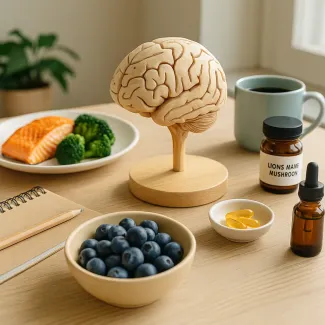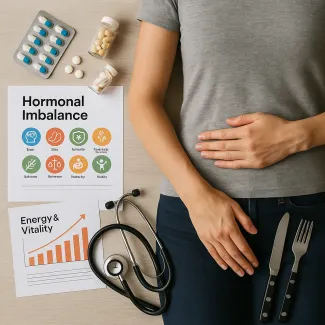
How Ongoing Stress Shapes Daily Eating Behavior
A Mechanism-Focused Look at Nutrition and Hormonal Rhythm
When daily pressure does not fully resolve, eating patterns often begin to shift in subtle but measurable ways. People may notice changes in appetite, food timing, cravings, or satiety without immediately linking them to hormonal regulation. In some cases, these shifts coexist with laboratory findings such as high cortisol on blood tests when daily stress feels unrelenting, but even without testing, the behavioral patterns themselves provide meaningful signals.
Cortisol follows a natural circadian rhythm. Under balanced conditions, it rises in the early morning to support alertness and gradually declines toward evening. When stress lingers, this rhythm can flatten, extend, or fluctuate in ways that influence hunger cues, blood sugar stability, and food preferences.
Understanding this interaction restores clarity. The goal is not to eliminate cortisol, but to observe how persistent activation reshapes everyday nutrition behavior.
Cortisol and Appetite Signaling
Cortisol interacts with multiple systems that regulate eating:
- It influences glucose availability, increasing circulating energy during stress.
- It interacts with insulin sensitivity, affecting how quickly blood sugar rises and falls.
- It modulates ghrelin and leptin, hormones that govern hunger and satiety.
- It can alter reward circuitry, increasing preference for calorie-dense foods during prolonged strain.
In short, stress does not merely change mood. It shifts metabolic priorities.
Early-Stage Stress: Suppressed Appetite
In acute stress, appetite often decreases. The body prioritizes vigilance and short-term survival over digestion. Individuals may skip meals or feel uninterested in food during high-pressure moments.
Mechanism:
- Sympathetic nervous system activation
- Reduced digestive signaling
- Temporary appetite suppression
Lingering Stress: Compensatory Eating
When stress becomes ongoing rather than acute, a different pattern often emerges. Cortisol remains elevated or dysregulated across the day. This can lead to:
- Increased late-evening hunger
- Cravings for refined carbohydrates or sweets
- Reduced sensitivity to fullness signals
- Irregular meal timing
This phase reflects metabolic adaptation, not lack of discipline. The body seeks rapid energy and comfort under prolonged demand.
Blood Sugar Stability and Cortisol Patterns
Cortisol supports glucose release from the liver. When repeatedly activated:
- Blood sugar may rise more easily.
- Energy can feel unstable, with afternoon dips.
- Individuals may rely on frequent snacking to maintain alertness.
Over time, this pattern reinforces a cycle:
stress → cortisol shift → glucose fluctuation → craving → temporary relief → renewed stress.
Recognizing this loop helps separate physiological drivers from personal judgment.
Meal Timing Under Chronic Pressure
One of the earliest visible markers of stress-related hormonal change is meal timing disruption.
Common patterns include:
- Delayed breakfast despite morning wakefulness
- Long gaps between meals followed by overeating
- Increased nighttime eating
- Reduced variety in food choices
These patterns often coincide with altered diurnal cortisol rhythm. When morning cortisol is blunted, energy may feel low on waking. When evening cortisol remains elevated, appetite can appear later in the day.
The Circadian Layer
Cortisol is not isolated. It coordinates with:
- Melatonin
- Insulin
- Body temperature cycles
If sleep shortens or becomes fragmented, cortisol recovery may be incomplete. Eating patterns then shift in response to fatigue rather than hunger alone.
Subtle Signals People Notice First
Before laboratory markers appear, individuals often describe:
- “I feel wired but tired.”
- “I crave something sweet late at night.”
- “My appetite is unpredictable.”
- “I eat differently when pressure builds.”
These are not diagnostic statements. They are experiential markers of a stress-adapted system.
Nutritional Patterns That Interact With Cortisol
Certain eating structures can either amplify or stabilize stress-related shifts.
Patterns that may intensify dysregulation:
- Skipping meals regularly
- High intake of refined sugars during fatigue
- Excess caffeine without adequate protein
- Eating primarily late at night
Patterns that tend to support stability:
- Regular meal timing
- Balanced macronutrient distribution
- Fiber-rich carbohydrates
- Consistent protein intake across the day
- Adequate hydration
The emphasis is rhythm rather than restriction.
Emotional Context and Food Decisions
Under prolonged stress, food choices are rarely purely nutritional. They become regulatory tools. Carbohydrate-rich foods can temporarily lower perceived stress by influencing serotonin pathways. Fat-rich foods can create sensory comfort. These effects are real but short-lived.
Understanding the mechanism reduces moral framing. Eating changes are often adaptive responses to hormonal signaling rather than character flaws.
When Cortisol Shifts Become Noticeable
Not every period of stress leads to measurable cortisol disruption. However, persistent changes in sleep, energy, and appetite over weeks or months suggest that the system is adapting to ongoing demand.
In that context, eating patterns function as both a mirror and a lever:
- A mirror of internal hormonal rhythm
- A lever that can gradually restore metabolic predictability
The aim is not rigid control. It is consistency.
Restoring a Sense of Regulation
Small adjustments can reintroduce stability:
- Eating within a consistent morning window
- Including protein at each meal
- Reducing long fasting gaps during high-stress phases
- Prioritizing evening wind-down routines
These changes do not “fix” cortisol. They support the body’s natural return to rhythmic balance.
Ongoing stress reshapes physiology quietly. Eating patterns often shift before laboratory values do. Observing these shifts without alarm allows individuals to respond with structure rather than urgency. In this way, nutrition becomes a stabilizing factor within a system that is adapting to prolonged demand.
FAQ questionWhy does my appetite feel unpredictable when I’m under steady pressure at work?
It is often mentioned that appetite changes are one of the first everyday signals of prolonged stress. In that context, people usually notice that some days they feel little interest in food, while on other days they crave something quick and comforting. This fluctuation is commonly associated with shifts in cortisol rhythm and blood sugar stability.
Over time, it can be observed that when stress lingers, hunger signals may no longer align neatly with mealtimes. Instead, they follow energy dips, emotional fatigue, or late-evening restlessness. In daily life, it makes sense to think about appetite not only as a reflection of discipline, but also as a reflection of internal hormonal timing.
Editor’s note: In practice, many readers first recognize the pattern not through lab results, but through comments like “I’m not hungry all day, then suddenly I can’t stop snacking at night.” That contrast often reveals more than a single number on a test
FAQ questionIs it possible that my evening sweet cravings are linked to cortisol rather than just habit?
In conversations about stress, it is frequently observed that cravings for refined carbohydrates increase later in the day. This is often connected to the way cortisol interacts with glucose availability and energy perception. When the body has been under sustained demand, it may lean toward faster sources of fuel, particularly in the evening when fatigue accumulates.
This does not automatically mean something is “wrong.” It is commonly associated with a system seeking predictability and relief after hours of mental strain. Over time, people may notice that cravings intensify during periods of reduced sleep or irregular meals, suggesting a broader rhythm issue rather than a simple preference.
Practical reflection: From an editorial standpoint, it is interesting how often sweet cravings appear during weeks with back-to-back meetings, late emails, and shorter nights. The pattern tends to mirror schedule pressure more than personality.
FAQ questionWhat if my blood test shows higher cortisol, but I feel mostly fine day to day?
It is often mentioned that laboratory values and lived experience do not always move in perfect sync. In such a context, people commonly report feeling “functional” while still noticing subtle shifts in energy, appetite timing, or sleep depth. Cortisol patterns can change gradually, and the body may adapt in ways that feel manageable at first.
In everyday life, it can be helpful to observe small, repeating signals: later dinners, irregular breakfast habits, afternoon energy drops, or stronger reliance on caffeine. These patterns are frequently discussed as part of the broader stress response, even when outward performance remains steady.
Rather than focusing on a single number, many find it more grounding to look at rhythm—how consistently meals, sleep, and energy align across the week. Subtle misalignment often provides context for understanding why eating patterns have shifted, even in the absence of dramatic symptoms.





